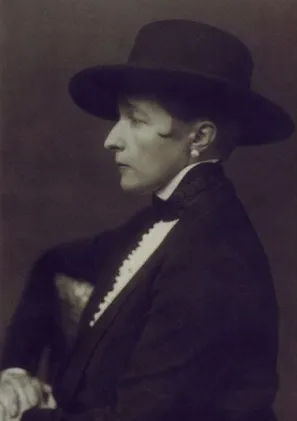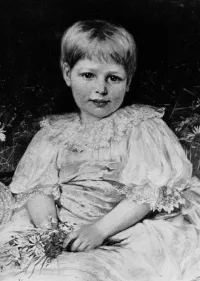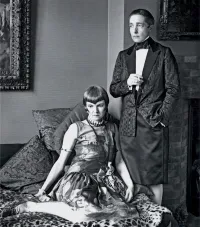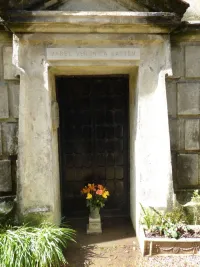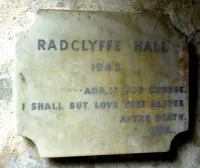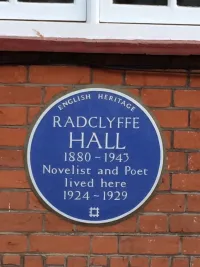Biography
1880 - 1943
“Language is surely too small a vessel to contain these emotions of mind and body that have somehow awakened a response in the spirit.”
- Radclyffe Hall
When British novelist Radclyffe Hall published The Well of Loneliness, it was the first widely read novel written in English to address lesbianism. The book was banned in the United Kingdom and became a cause célèbre that pitted conservative journalists, moralists and the British legal system against medical experts, scientists, sex-researchers, and some of the most noted authors and publishers of the time. It tells the story of Stephen Gordon, a woman given a man’s name by parents that wanted a boy, who is irresistibly drawn to other women despite the condemnation of virtually everyone around her. She meets the love of her life, Mary Llewellyn, during World War I in France. The two set out to build a life for themselves but Stephen comes to believe Mary’s life is beginning to suffer. To “save” her, she feigns an affair to drive Mary into a heterosexual marriage, hoping it will provide her with the social acceptance they could never have living at the fringes of society. The novel ends with Stephen's plea to God: "Give us also the right to our existence!” Though it met with similar resistance when plans were made to distribute it in the US, all the attempts to suppress The Well of Loneliness resulted in greater publicity about lesbianism. By the time the case came to trial, it had already been reprinted six times, selling over 100,000 copies its first year alone. Hall knew she was a trailblazer and was well-aware of the price she would pay for the notoriety the novel’s publication would bring to her. She also knew the price gay people pay to remain in the closet and railed against the “conspiracy of silence” enforced on homosexuals saying “Nothing is so spiritually degrading or so undermining of one’s morale as living a lie, as keeping friends only by false pretenses.” The Well of Loneliness was enormously influential for generations of women throughout the 20th-century and continues to provoke strong reactions in some readers. Translated into 14 languages it has been in print continuously since its initial publication in 1928.
1880 - 1943
“Language is surely too small a vessel to contain these emotions of mind and body that have somehow awakened a response in the spirit.”
- Radclyffe Hall
When British novelist Radclyffe Hall published The Well of Loneliness, it was the first widely read novel written in English to address lesbianism. The book was banned in the United Kingdom and became a cause célèbre that pitted conservative journalists, moralists and the British legal system against medical experts, scientists, sex-researchers, and some of the most noted authors and publishers of the time. It tells the story of Stephen Gordon, a woman given a man’s name by parents that wanted a boy, who is irresistibly drawn to other women despite the condemnation of virtually everyone around her. She meets the love of her life, Mary Llewellyn, during World War I in France. The two set out to build a life for themselves but Stephen comes to believe Mary’s life is beginning to suffer. To “save” her, she feigns an affair to drive Mary into a heterosexual marriage, hoping it will provide her with the social acceptance they could never have living at the fringes of society. The novel ends with Stephen's plea to God: "Give us also the right to our existence!” Though it met with similar resistance when plans were made to distribute it in the US, all the attempts to suppress The Well of Loneliness resulted in greater publicity about lesbianism. By the time the case came to trial, it had already been reprinted six times, selling over 100,000 copies its first year alone. Hall knew she was a trailblazer and was well-aware of the price she would pay for the notoriety the novel’s publication would bring to her. She also knew the price gay people pay to remain in the closet and railed against the “conspiracy of silence” enforced on homosexuals saying “Nothing is so spiritually degrading or so undermining of one’s morale as living a lie, as keeping friends only by false pretenses.” The Well of Loneliness was enormously influential for generations of women throughout the 20th-century and continues to provoke strong reactions in some readers. Translated into 14 languages it has been in print continuously since its initial publication in 1928.
Demography
Demography
Gender Female
Sexual Orientation Lesbian
Gender Identity Cisgender
Ethnicity Caucasian/White
Faith Construct Catholic
Nations Affiliated Afghanistan United Kingdom
Era/Epoch Roaring Twenties (1920-1929)
Field(s) of Contribution
Author
Poet
Commemorations & Honors
Gold Medal of the Eichelbergher Humane Award (1930)
Demography
Gender Female
Sexual Orientation Lesbian
Gender Identity Cisgender
Ethnicity Caucasian/White
Faith Construct Catholic
Nations Affiliated Afghanistan United Kingdom
Era/Epoch Roaring Twenties (1920-1929)
Field(s) of Contribution
Author
Poet
Commemorations & Honors
Gold Medal of the Eichelbergher Humane Award (1930)
Resources
Resources
Baker, Michael. Our Three Selves: The Life of Radclyffe Hall. New York: Morrow, 1985.
Breen, Margaret Soenser. "Narrative Inversion: The Biblical Heritage of The Well of Loneliness and Desert of the Heart." Reclaiming the Sacred: The Bible in Gay and Lesbian Culture. Raymond-Jean Frontain, ed. New York: Haworth, 1997. 187-206.
Brittain, Vera. Radclyffe Hall: A Case of Obscenity? New York: Barnes, 1969.
Dickson, Lovat. Radclyffe Hall at the Well of Loneliness: A Sapphic Chronicle. London: Collins, 1975.
Madden, Ed. "The Well of Loneliness, or The Gospel According to Radclyffe Hall." Reclaiming the Sacred: The Bible in Gay and Lesbian Culture. Raymond-Jean Frontain, ed. New York: Haworth, 1997. 163-186.
Ormrod, Richard. Una Troubridge: The Friend of Radclyffe Hall. London: Cape, 1984.
Ruehl, Sonja. "Inverts and Experts: Radclyffe Hall and the Lesbian Identity." Feminism, Culture, and Politics. Rosalind Brunt and Caroline Rowan, eds. London: Lawrence and Wishart, 1983. 15-36.
Souhami, Diana. The Trials of Radclyffe Hall. London: Weidenfield and Nicolson, 1998.
Troubridge, Una. The Life and Death of Radclyffe Hall. London: Hammond, 1961.
http://en.wikipedia.org/wiki/Radclyffe_Hall
http://www.thecrimson.com/article/1998/3/13/radclyffe-hall-more-than-a-martyr/
http://www.independent.co.uk/news/uk/lesbian-writer-rests-in-restored-peace-1441553.html
Resources
Baker, Michael. Our Three Selves: The Life of Radclyffe Hall. New York: Morrow, 1985.
Breen, Margaret Soenser. "Narrative Inversion: The Biblical Heritage of The Well of Loneliness and Desert of the Heart." Reclaiming the Sacred: The Bible in Gay and Lesbian Culture. Raymond-Jean Frontain, ed. New York: Haworth, 1997. 187-206.
Brittain, Vera. Radclyffe Hall: A Case of Obscenity? New York: Barnes, 1969.
Dickson, Lovat. Radclyffe Hall at the Well of Loneliness: A Sapphic Chronicle. London: Collins, 1975.
Madden, Ed. "The Well of Loneliness, or The Gospel According to Radclyffe Hall." Reclaiming the Sacred: The Bible in Gay and Lesbian Culture. Raymond-Jean Frontain, ed. New York: Haworth, 1997. 163-186.
Ormrod, Richard. Una Troubridge: The Friend of Radclyffe Hall. London: Cape, 1984.
Ruehl, Sonja. "Inverts and Experts: Radclyffe Hall and the Lesbian Identity." Feminism, Culture, and Politics. Rosalind Brunt and Caroline Rowan, eds. London: Lawrence and Wishart, 1983. 15-36.
Souhami, Diana. The Trials of Radclyffe Hall. London: Weidenfield and Nicolson, 1998.
Troubridge, Una. The Life and Death of Radclyffe Hall. London: Hammond, 1961.
http://en.wikipedia.org/wiki/Radclyffe_Hall
http://www.thecrimson.com/article/1998/3/13/radclyffe-hall-more-than-a-martyr/
http://www.independent.co.uk/news/uk/lesbian-writer-rests-in-restored-peace-1441553.html
